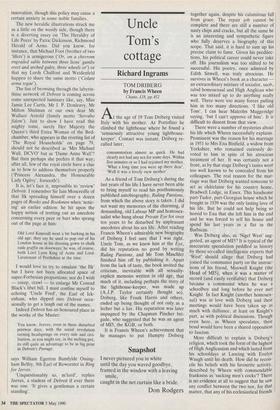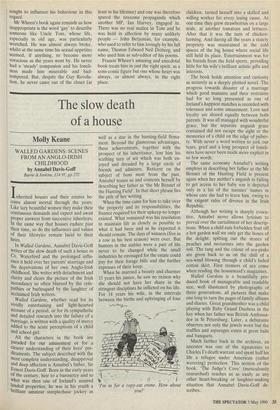Uncle Tom's cottage
Richard Ingrams
TOM DRIBERG by Francis Wheen
Chatto, f18, pp.452
At the age of 19 Tom Driberg visited Italy with his mother. At Portofino he climbed the lighthouse where he found a 'sensuously attractive young lighthouse- keeper'. Contact was instant, Driberg re- called later,
consummation almost as quick. He had clearly not had any sex for some days. Within five minutes or so I had rejoined my mother. `What a long time you were up there dear'. 'Well it was a lovely view mother'.
As a friend of Tom Driberg's during the last years of his life I have never been able to bring myself to read his posthumously published autobiography, Ruling Passions, from which the above story is taken. I did not want my memories of the charming, if demanding, old Labour MP and homosex- ualist who hung about Private Eye for over ten years to be disturbed by unpleasant anecdotes about his sex life. After reading Francis Wheen's admirable new biography of Driberg I feel sure that I was right. Uncle Tom, as we knew him at the Eye, did his reputation no good by writing Ruling Passions, and Mr Tom Maschler finished him off by publishing it. Apart from the lack of taste, the book invited the criticism, inevitable with all sexually- explicit memoirs written in old age, that much of it, including perhaps the story of the lighthouse-keeper, was made up (A.J.P. Taylor certainly thought so). Driberg, like Frank Harris and others, ended up being thought of not only as a lecher but a liar. His reputation was later impugned by the Chapman Pincher bri- gade, who suggested that he was an agent of MI5, the KGB, or both.
It is Francis Wheen's achievement that he manages to put Humpty Driberg together again, despite his calamitous fall from grace. The repair job cannot be complete and there are still a number of nasty chips and cracks, but all the same he is an interesting and sympathetic figure who fully deserves a biography of this scope. That said, it is hard to sum up his precise claim to fame. Given his predilec- tions, his political career could never take off. His journalism was too stilted to be successful. His poetry, once admired by Edith Sitwell, was truly atrocious. He survives in Wheen's book as a character an extraordinary mixture of socialist, snob, rabid homosexual and High Anglican who was too mixed up to do anything really well. There were too many forces pulling him in too many directions. 'I like old Tom', I can hear Malcolm Muggeridge saying, 'but I can't approve of him'. It is difficult to dissent from that view.
There were a number of mysteries about his life which Wheen successfully explains. Prominent was the reason for his marriage in 1951 to Mrs Ena Binfield, a widow from Yorkshire, who remained curiously de- voted to him in spite of his atrocious treatment of her. It was certainly not a front, as by that stage Driberg's tastes were too well known to be concealed from his colleagues. The real reason for the mar- riage was that Driberg wanted someone to act as chatelaine for his country home, Bradwell Lodge, in Essex. This handsome part-Tudor, part-Georgian house which he bought in 1939 was the only lasting love of his life. But he could not help being so horrid to Ena that she left him in the end and he was forced to sell his house and spend his last years in a flat in the Barbican.
Was Driberg also, as 'Nigel West' sug- gested, an agent of MI5? It is typical of the inaccurate speculation peddled as history by those so-called intelligence experts that `West' should allege that Driberg had joined the communist party on the instruc- tions of his friend, Maxwell Knight (the Head of MI5), when it was a matter of record (and easily verifiable) that Driberg became a communist when he was a schoolboy and long before he ever met Knight. In fact Knight (another homosex- ual) was in love with Driberg and their meetings would have been taken up as much with dalliance, at least on Knight's part, as with political discussions. Though even here, as Wheen speculates, their bond would have been a shared opposition to fascism.
More difficult to explain is Driberg's religion, which took the form of the highest of High Anglicanism and which lasted from his schooldays at Lancing with Evelyn Waugh until his death. How did he recon- cile his beliefs with his favourite activity, described by Wheen with commendable frankness as 'sucking men's cocks'? There is no evidence at all to suggest that he saw any conflict between the two nor, for that matter, that any of his ecclesiastical friends sought to influence his behaviour in this regard.
Mr Wheen's book again reminds us how inappropriate is the word 'gay' to describe someone like Uncle Tom, whose life, especially in old age, was particularly wretched. He was almost always broke, whilst at the same time his sexual appetites seemed, if anything, to become more voracious as the years went by. He never had a 'steady' companion and his loneli- ness made him miserable and bad- tempered. But, despite the Gay Revolu- tion, he never came out of the closet (at least in his lifetime) and one was therefore spared the tiresome propaganda which another MP, Ian Harvey, engaged in. There was no real malice in Tom and he was held in affection by many unlikely people — John Betjeman, for example, who used to refer to him lovingly by his full name, Thomas Edward Neil Driberg, and who used him as sub-editor of his poems.
Francis Wheen's amusing and anecdotal book treats him in just the right spirit, as a semi-comic figure but one whose heart was always, or almost always, in the right place.



















































 Previous page
Previous page